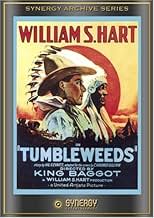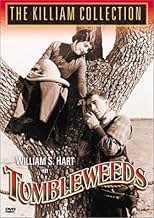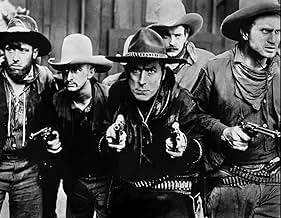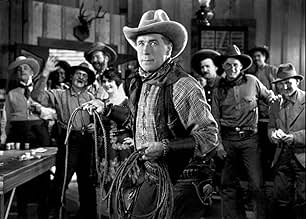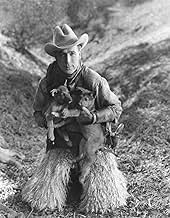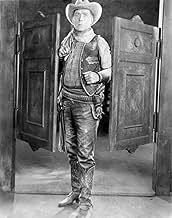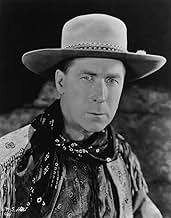IMDb-BEWERTUNG
6,6/10
737
IHRE BEWERTUNG
Füge eine Handlung in deiner Sprache hinzuThe government will grant a fringe of terrain for the settlers who want to live and work there. The starting sign will be a gunshot which will iniciate the run for the best fields and claims... Alles lesenThe government will grant a fringe of terrain for the settlers who want to live and work there. The starting sign will be a gunshot which will iniciate the run for the best fields and claims.The government will grant a fringe of terrain for the settlers who want to live and work there. The starting sign will be a gunshot which will iniciate the run for the best fields and claims.
- Regie
- Drehbuch
- Hauptbesetzung
William S. Hart
- Don Carver
- (as Wm. S. Hart)
- …
Richard Neill
- Bill Freel
- (as Richard R. Niell)
George F. Marion
- Old Man
- (as George Marion)
Taylor N. Duncan
- Cavalry Major
- (as Ted Duncan)
Nora Cecil
- Pioneer Mother
- (Nicht genannt)
Nino Cochise
- Indian
- (Nicht genannt)
Monte Collins
- Hicks
- (Nicht genannt)
Fred Gamble
- Hotel Proprietor
- (Nicht genannt)
George Marion
- Homesteader
- (Nicht genannt)
Apache Bill Russell
- Indian
- (Nicht genannt)
Empfohlene Bewertungen
Seen in a 16mm print from the 1939 release (not necessarily the 1975 restoration listed by imdb), the sheer sincerity of the film-makers appealed highly. Intelligent art-gallery audience loved it - shown on 40th anni of Hart's death. Sound was coarse (expected) but loud and consistent in quality with image
After a while, watching "Tumbleweeds" starts to feel like homework. The movie wore me down after a while. I've seen a lot of silent movie comedies. Many of them aged quite well. As for as dramas go, I haven't seen nearly as many. For me they haven't aged as well. They are a lot harder to watch than the comedies. Add into the mix a very stiff (and seemingly self-serious) William S. Hart and "Tumbleweeds" doesn't stand a chance. There are a few laughs and some exciting action but they are too few and far between. "Tumbleweeds" is okay but it feels a lot longer than its actual running time.
"Tumbleweeds" is a classic of the silent era. It marked the final film in the career of western movie pioneer William S. Hart.
The plot revolves around the Cherokee Land Rush of 1889 Oklahoma where a large tract of land was thrown open to the public for the taking by the American government.
Don Carver (Hart) and his pal Kentucky Rose (Lucien Littlefield) had been earning their living as "tumbleweeds", another name for drifting cowpokes. When the last roundup is completed, they decide to take part in the land rush. Carver meets up with the charming Molly Lassiter (Barbara Bedford) after having had an altercation with her half brother Noll (J. Gordon Russell). Noll teams up with Bill Freel (Richard R. Neill) to acquire a choice ranch section by any means necessary. Turns out that Carver has his sights set on the same ranch which he wants to get for Molly.
The highlight of the film is of course, the land rush sequence. It is marvelously staged by Directors King Baggot and Hart himself. A cast of thousands was employed. A remarkable piece of film making for this or any other time.
The version of the film that is usually shown these days is the 1939 re-issue which had sound effects added, as well as a moving prologue filmed especially for this version. It features Hart coming out of retirement and describing the film and then talking about his career and in effect saying goodbye to all of his fans. He had left films after "Tumbleweeds" following a dispute with the film's distributor.
Hart had always insisted on realism in his films. This had worked in his early films but in the 20s, he had to compete with the more popular films of the flamboyant Tom Mix. He had reached his 60s by this time so he wisely decided to go out on top.
Ohh...the thrill of it all!
The plot revolves around the Cherokee Land Rush of 1889 Oklahoma where a large tract of land was thrown open to the public for the taking by the American government.
Don Carver (Hart) and his pal Kentucky Rose (Lucien Littlefield) had been earning their living as "tumbleweeds", another name for drifting cowpokes. When the last roundup is completed, they decide to take part in the land rush. Carver meets up with the charming Molly Lassiter (Barbara Bedford) after having had an altercation with her half brother Noll (J. Gordon Russell). Noll teams up with Bill Freel (Richard R. Neill) to acquire a choice ranch section by any means necessary. Turns out that Carver has his sights set on the same ranch which he wants to get for Molly.
The highlight of the film is of course, the land rush sequence. It is marvelously staged by Directors King Baggot and Hart himself. A cast of thousands was employed. A remarkable piece of film making for this or any other time.
The version of the film that is usually shown these days is the 1939 re-issue which had sound effects added, as well as a moving prologue filmed especially for this version. It features Hart coming out of retirement and describing the film and then talking about his career and in effect saying goodbye to all of his fans. He had left films after "Tumbleweeds" following a dispute with the film's distributor.
Hart had always insisted on realism in his films. This had worked in his early films but in the 20s, he had to compete with the more popular films of the flamboyant Tom Mix. He had reached his 60s by this time so he wisely decided to go out on top.
Ohh...the thrill of it all!
Just from reading about him, I became a fan of William S. Hart before I ever saw one of his movies.
When I moved to Los Angeles, I made a pilgrimage to the late lamented Silent Movie Theatre on Fairfax, not only to see whatever silent films there might be available, but to plead for a chance to see any Hart film, and especially "Tumbleweeds," about which I had read so much.
Alas, the Hamptons, owners of the Theatre, never did show it, but I was able to rent a 16 mm print and show it myself, in my tiny living room.
It was all I had hoped. It was, and is, magnificent.
Character development was nigh onto perfect, and the intertitles by C. Gardner Sullivan, surely one of the greatest of such writers, merely enhanced the beauty of the presentation.
Oh, but there is more: Camera angles were brilliantly formatted. Only later did I learn that Mr. Hart himself was co-director.
William S. Hart (http://www.imdb.com/name/nm0366586/?ref_=fn_al_nm_1) was born a city slicker but, like me, I guess, he fell in love with the West and its mystique. He wanted to share that love with everyone, and for too few years presented the mythology.
You can find his spoken farewell at YouTube (https://www.youtube.com/watch?v=_BlgWP3Airs), and if you're really lucky you will find a copy of "Tumbleweeds" with that farewell used as a prologue. It still moves me to tears.
One reason I cry is that, listening to him, I think how great a talkie actor he could have been, with that voice; and I think what a loss to those of us who love Westerns generally and who love William S. Hart in particular.
"Tumbleweeds" is a classic, regardless of genre.
It is poetry on film, a magnificent motion picture.
When I moved to Los Angeles, I made a pilgrimage to the late lamented Silent Movie Theatre on Fairfax, not only to see whatever silent films there might be available, but to plead for a chance to see any Hart film, and especially "Tumbleweeds," about which I had read so much.
Alas, the Hamptons, owners of the Theatre, never did show it, but I was able to rent a 16 mm print and show it myself, in my tiny living room.
It was all I had hoped. It was, and is, magnificent.
Character development was nigh onto perfect, and the intertitles by C. Gardner Sullivan, surely one of the greatest of such writers, merely enhanced the beauty of the presentation.
Oh, but there is more: Camera angles were brilliantly formatted. Only later did I learn that Mr. Hart himself was co-director.
William S. Hart (http://www.imdb.com/name/nm0366586/?ref_=fn_al_nm_1) was born a city slicker but, like me, I guess, he fell in love with the West and its mystique. He wanted to share that love with everyone, and for too few years presented the mythology.
You can find his spoken farewell at YouTube (https://www.youtube.com/watch?v=_BlgWP3Airs), and if you're really lucky you will find a copy of "Tumbleweeds" with that farewell used as a prologue. It still moves me to tears.
One reason I cry is that, listening to him, I think how great a talkie actor he could have been, with that voice; and I think what a loss to those of us who love Westerns generally and who love William S. Hart in particular.
"Tumbleweeds" is a classic, regardless of genre.
It is poetry on film, a magnificent motion picture.
In the 1939 re-release's introduction, William S. Hart explains, "The story of 'Tumbleweeds' marks one of the greatest epochs of our American history. It tells of the opening of the Cherokee Strip in the year 1889. Twelve hundred square miles of Cherokee Indian lands, on one front, over two hundred miles long, were thrown open by our government to those seeking good earth upon which they might make their homes."
Mr. Hart (as Don Carver) and comic sidekick Lucien Littlefield (as Kentucky Rose) are two of the cattle ranchers who are put out when as the Oklahoman Cherokee Strip is "thrown open" by the government. For Hart, the silver lining comes in the form of a several decades younger sweetheart, homesteader Barbara Bedford (as Molly Lassiter); however, her nasty half-brother J. Gordon Russell (as Noll Lassiter) threatens to spoil the fun. Little brother Jack Murphy (as Bart Lassiter) and his pup have the highest profile relationship that actually works. Still, the film has Hart, and its exciting "land rush!" sequence.
The re-release (which, apart from Hart's cool Shakespearian appearance, is the inferior version, by the way) features the legendary star's farewell:
"My friends, I loved the art of making motion pictures. It is as the breath of life to me no longer a cloud of dust, but a beautiful golden haze through which appears a long phantom herd of trailing cattle. At their head, a Pinto pony with an empty saddle the boys up ahead are calling -- they're waiting for you and me to help drive this last great round-up into eternity
"Adios, amigos. God bless you all, each and every one."
******* Tumbleweeds (12/20/25) King Baggot ~ William S. Hart, Lucien Littlefield, Barbara Bedford
Mr. Hart (as Don Carver) and comic sidekick Lucien Littlefield (as Kentucky Rose) are two of the cattle ranchers who are put out when as the Oklahoman Cherokee Strip is "thrown open" by the government. For Hart, the silver lining comes in the form of a several decades younger sweetheart, homesteader Barbara Bedford (as Molly Lassiter); however, her nasty half-brother J. Gordon Russell (as Noll Lassiter) threatens to spoil the fun. Little brother Jack Murphy (as Bart Lassiter) and his pup have the highest profile relationship that actually works. Still, the film has Hart, and its exciting "land rush!" sequence.
The re-release (which, apart from Hart's cool Shakespearian appearance, is the inferior version, by the way) features the legendary star's farewell:
"My friends, I loved the art of making motion pictures. It is as the breath of life to me no longer a cloud of dust, but a beautiful golden haze through which appears a long phantom herd of trailing cattle. At their head, a Pinto pony with an empty saddle the boys up ahead are calling -- they're waiting for you and me to help drive this last great round-up into eternity
"Adios, amigos. God bless you all, each and every one."
******* Tumbleweeds (12/20/25) King Baggot ~ William S. Hart, Lucien Littlefield, Barbara Bedford
Wusstest du schon
- Wissenswertes(at around 1h 7 mins) Just after the locked-up "Sooners" rush Dan Carver, who is cutting through a rail, the scene shifts to a team of horses pulling a wagon. The right "off" wheeler horse can be seen to go lame but continue running with a noticeable limp.
- Zitate
Don Carver: Boys - it's the last of the West.
- Alternative VersionenThe 1939-reissued version was preceded by an eight-minute sound prologue with William S. Hart introducing the film.
- VerbindungenFeatured in The Great Chase (1962)
Top-Auswahl
Melde dich zum Bewerten an und greife auf die Watchlist für personalisierte Empfehlungen zu.
Details
Box Office
- Budget
- 312.000 $ (geschätzt)
- Laufzeit1 Stunde 18 Minuten
- Sound-Mix
- Seitenverhältnis
- 1.33 : 1
Zu dieser Seite beitragen
Bearbeitung vorschlagen oder fehlenden Inhalt hinzufügen

